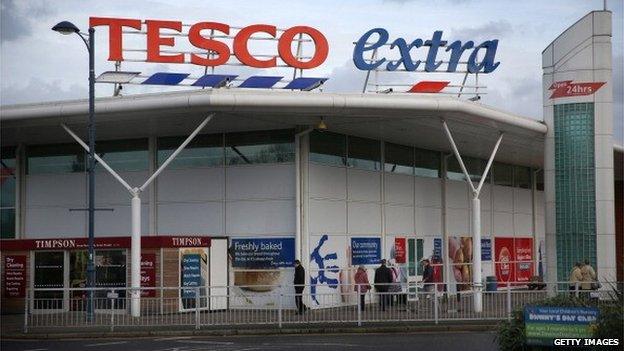Tesco hits the bottom
- Published
- comments

In the corporate world it's known as "kitchen-sinking" - finding all the bad stuff buried down the back of the sofa, adding it together and announcing a whopping great loss.
Today, Tesco became its latest proponent. In fact, to the kitchen sink Dave Lewis, the chief executive, has added the washing machine, the dish washer and the deep fat fryer.
The big, hairy, shiver-down the spine number is the revaluation of Tesco's 3,000 UK supermarkets and its stores overseas.
With the value of sales down and shoppers turning away from larger out-of-town stores, the business has admitted that its property portfolio simply isn't as valuable as it once believed.
To keep that in perspective, the £4.7bn writedown is what is known as a "non-cash charge". That is, it is an accounting measure rather than a statement on how profitable the core business is.
Sainsbury's and Morrison's have made similar announcements on supermarket revaluations.
Other problems for Tesco include a one-off charge for its failed Chinese joint venture; a change in the way it values the stock it keeps in its warehouses (it's worth £570m less than it previously believed); increased payments to its pension fund where debts are significantly higher and a restructuring in Europe which, at a cost of £416m, will bring the four eastern European businesses under one management structure.
The key words connected to all those numbers that Mr Lewis would like us to focus on is "one-off".
Tesco's overall business - the shops - is still operating at a profit, although at £1.4bn it is far lower than last year.
Mr Lewis has invested in cutting prices and putting more staff in stores and there is some evidence that customers are returning.
For the moment, that is the chief executive's focus - "volume", or the number of people coming through the shop doors or buying online.
He judges that if he can encourage customers back with lower prices, even if it means far slimmer profit margins, he can put Tesco back on the road to growth.
He points out that when Tesco dropped prices on 117 brands, the volume of sales went up by 28%.
The business will also look at the quality of the products on offer. A review of Tesco's ranges will take 18 months.
At this stage, investors are giving him the benefit of the doubt. The share price is up more than 2% in morning trading.
"Investors are possibly focusing on the underlying improvement and indeed consensus seems to be for an increase in underlying profits next year," said Nicla Di Palma of analysts Brewin Dolphin.
Tesco is also looking to sell its vast data business, Dunnhumby, which could bring in £2bn.
But, as Ms Di Palma says, there are still significant hurdles.
Capital investment is down (that's money spent on improving stores), debts are up and the UK business - the mainstay of the company - operated at a loss for the second half of 2014.
Mr Lewis is hoping that investors will be patient. It could take two years to turn the business around. Until then, fewer days of bad news like this morning's would be most welcome to investors.